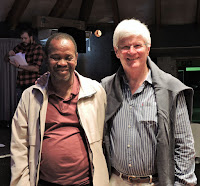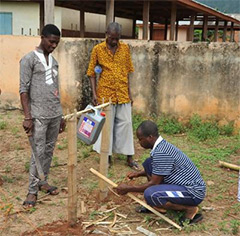 It was a busy week! Marilyn Bassin came to talk to us about Boikanyo -the Dion Herson Foundation. She showed us a lot of interesting pictures and is is really quite amazing what the Foundation achieves.
It was a busy week! Marilyn Bassin came to talk to us about Boikanyo -the Dion Herson Foundation. She showed us a lot of interesting pictures and is is really quite amazing what the Foundation achieves. It was so refreshing to have someone come and talk to us about what was being achieved and not to ask us for money!
I enjoy watching Rotarians' eyes glaze over when that happens.
A Guitar for Martin Mabula
 |
| Martin Mabula & Richard Tonkin |
Richard Tonkin has driven this project and he presented Martin with the guitar.
The rest of the evening was most enjoyable with music by Darren & Lauren, Bars, Nippy, John, Allan and Andreas & Marcus. The musician who really blew everyone away was Yohan Song with his extraordinarily inventive guitar playing.
The 'TJ' have invited us to attend their meetings when ever we want to and have resurrected the idea of a joint fundraising concert to benefit musicians by producing CD's....if they still exist!
Careers Day

 Saturday saw Rotarians descend on Holy Family College in Parktown for our annual Careers Day. We had more bases than ever this year with newcomers including Physiotherapy, Aviation and Beautician. Another innovation was to bring all he bases relating to Business together plus some additional ones. They ranged from Business Administration, Entrepreneurship, Retail etc. This this was much more successful as it made questions and discussions much easier.
Saturday saw Rotarians descend on Holy Family College in Parktown for our annual Careers Day. We had more bases than ever this year with newcomers including Physiotherapy, Aviation and Beautician. Another innovation was to bring all he bases relating to Business together plus some additional ones. They ranged from Business Administration, Entrepreneurship, Retail etc. This this was much more successful as it made questions and discussions much easier.Our special thanks to all the non Rotarians for their help and assistance and especially to Mark Potterton, the school principal, who not only provides the venue but works tirelessly to make things happen and organises the tertiary institutions.
We have had some great feedback from the learners and that is what it is all about.
Thank you everyone for your support and helping make Careers Day such a success.
This Week
Our speaker is Moira Katz, the CEO of the National Childrens' Theatre.
The year 2014 marked the 25th Anniversary of NCT since it was established by Joyce Levinsohn in 1989, and which earned her a Lifetime Achievement Award.
Since the new management under the leadership of Moira Katz in 2012, the company has been building a reputation as Gauteng�s premier children�s theatre, extending our range from regular theatre and musicals to include educational programmes, an HIV/AIDS information programme, a bullying awareness programme, classics for high schools.

NCT has made its mark by providing professionalism and artistic excellence in all aspects. The loyal and dedicated staff of 12 work hard to present 6 full theatre productions a year, catering to family theatre, schools outreach programmes, visits to rural areas, Saturday morning workshops for over 140 children, our NACTIES programme for budding Thespians, educational workshops in a variety of aspects of theatre. We believe in building community partnerships, creating jobs for newly qualified actors as well as developing a new generation of theatre supporters through entertaining and engaging programs.
For the past 24 years NCT has produced outstanding theatrical plays and educational programs which have won several national and international awards including 5 Naledi Awards, and an IPRA Golden World Award for Excellence in Public Relations in the Arts category.
A recent success was NCT's MANDELA DAY partnership with Hillbrow Theatre Project where we hosted an American Youth Group from Salt Lake City, who presented SYNERGY: A VOICE TO THE WORLD. Synergy is supported by Friendship Ambassadors Foundation, an NGO, formally associated with the United Nations Department of Public Information, with Consultative Status at UNESCO.
Good news for Ghana sanitation efforts

Rotary and USAID are creating Tippy Tap devices to encourage good hygiene in remote areas. The devices use a simple foot paddle to tip a water container so people can safely wash their hands.
By Mohamed Keita, RI staff, Administrative Coordinator, Areas of Focus, Programs and Grants
In January, a new government came into office in Ghana and set a different tone in addressing access to water and public sanitation in the country. President Nana Akufo-Addo announced the creation of a Ministry for Sanitation and Water Resources. It is the first time an administration has dedicated the centrepiece of an executive cabinet agency to public sanitation.
Ghanaian Rotarians who are involved in the rollout of the Rotary-USAID International H2O Collaboration, a $4 million initiative to support lasting, positive change to water, sanitation, and hygiene (WASH) initiatives in Ghana, have welcomed the move.
“A major challenge facing our country is access to water to our people. Indeed, ‘water for all’ is one of our slogans for our 2016 manifesto,” the president declared in the press. “We also made a slogan ‘a toilet for all’ and these are matters we take very seriously.”
Previously, WASH related issues in Ghana fell under the purview of the Ministry of Water resources, Works and Housing. President Akufo-Addo said the change was necessary because of the major challenge facing the country with respect to access to water and sanitation.
Both local and international stakeholders involved in WASH activities in Ghana have applauded the creation of the new ministry. “This is like being alone in a boat which is struggling to go upstream and suddenly getting another person to help with the rowing,” Ako Adotei, chair of the Host Committee of the Rotary-USAID partnership in Ghana, told me. The partnership, which involves 36 Rotary clubs, Global Communities, USAID’s implementing partner in Ghana, and the government via the Community Water & Sanitation Agency (CWSA), is preparing to roll out activities to improve water and sanitation conditions in 165 rural communities.
Beyond simply building infrastructure, the Rotary-USAID partnership involves peculiar aspects that are unusual in most Rotarian projects: empowering communities in: a) financial self-sustainability to support infrastructure maintenance b) advocating with local authorities for equitable resource allocation c) developing innovation from lessons learned. To this effect, about two dozen Rotarians participated in a training workshop on advocacy in mid-January in the capital Accra.
In Ghana, the poorest communities rely on local government and outside support for funding maintenance and operations costs for sanitation infrastructure. However, funding gaps and delays at the local district assemblies prevent the resources allocated by the Ghanaian government to trickle down to the neediest communities.
“Holding the district assemblies to account – that is really the greatest challenge,” says Peter Aniglo of the Rotary Club of Sunyani Central. Aniglo feels the workshop made clearer the pertinence of understanding the laws and regulations in order to train communities to understand their rights, the importance of helping communities organize self-funding methods, and the need to engage decision makers at the district assemblies.
The Rotarians came to the workshop with no prior experience with advocacy, but went away with a better understanding of its value in elevating the work of Rotary. Beatrice Baiden of the Rotary Club of Accra Dzorwolu, says “the training made me gain better understanding of the WASH sector with regards to policy and guidelines available, challenges of the WASH program, and how we could use advocacy to address the challenges as Rotarians.”
Aniglo notes the advocacy training is going a long way in helping sustain projects.





No comments:
Post a Comment